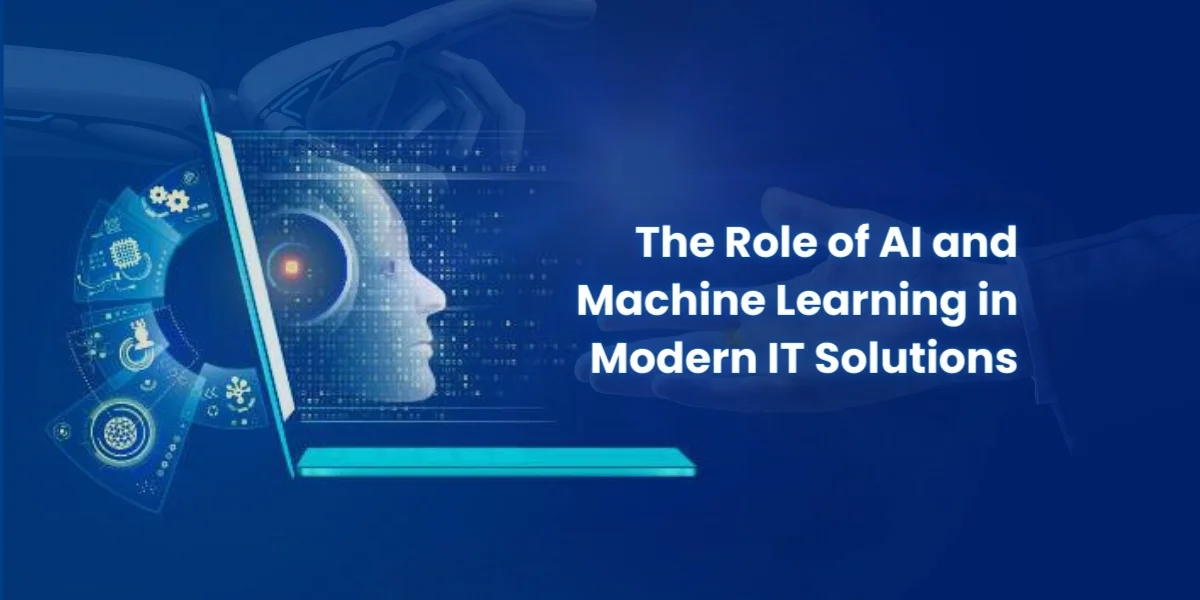
In the rapidly evolving landscape of information technology, Artificial Intelligence (AI) and Machine Learning (ML) have emerged as transformative forces. These technologies are not just buzzwords but are actively reshaping the way businesses operate, optimize processes, and deliver value. This blog explores the critical role AI and ML play in modern IT solutions, highlighting their impact, applications, and future potential.
Artificial Intelligence (AI) is the field of computer science dedicated to developing machines and systems capable of performing tasks that traditionally require human intelligence. These tasks encompass a wide range of abilities, including but not limited to visual perception, speech recognition, decision-making, and language translation. AI aims to replicate human cognitive functions and enable machines to learn from experience, adjust to new inputs, and perform tasks autonomously. AI systems are designed to learn from experience and adapt to new information, enabling them to improve their performance over time. This ability to mimic human cognitive functions makes AI a powerful tool in modern technology.
Machine Learning, a branch of Artificial Intelligence, utilizes algorithms and statistical models to empower computers to enhance their performance on tasks by learning from data and experience. ML systems learn from data, identify patterns, and make decisions with minimal human intervention.
One of the most significant contributions of AI and ML to IT solutions is the enhancement of data analysis capabilities. Traditional data analysis methods often struggle with large and complex datasets. AI and ML algorithms, however, can process vast amounts of data quickly and accurately, uncovering hidden patterns and insights. This capability is crucial for businesses looking to leverage big data for strategic decision-making.
AI and ML are revolutionizing cybersecurity by providing advanced threat detection and response mechanisms. These technologies can analyze network traffic, identify unusual patterns, and detect potential threats in real time. Machine learning models can be trained to recognize various types of cyber attacks, significantly reducing the time required to detect and respond to security breaches. This proactive approach strengthens the overall security stance of organizations.
Automation is another area where AI and Machine Learning are making a profound impact. Routine and repetitive tasks that consume valuable human resources can now be automated, allowing employees to focus on more strategic and creative endeavors. For example, AI-powered chatbots can handle customer inquiries, while ML algorithms can automate data entry and processing tasks. This not only enhances efficiency but also mitigates the risk of human errors.
In the realm of customer service, AI and ML are enabling businesses to deliver highly personalized experiences. By analyzing customer data, these technologies can predict preferences and behaviors, allowing companies to tailor their offerings to individual customers. Personalized recommendations, targeted marketing campaigns, and customized content are some of the ways AI and ML enhance customer engagement and satisfaction.
Predictive maintenance is a powerful application of AI and ML in industries such as manufacturing, transportation, and energy. By analyzing data from sensors and machines, ML algorithms can predict when equipment is likely to fail, allowing for timely maintenance and preventing costly downtime. This approach not only extends the lifespan of assets but also optimizes operational efficiency.
Natural Language Processing, a branch of AI, focuses on the interaction between computers and humans through natural language. NLP is widely used in applications such as chatbots, virtual assistants, and language translation services. In IT solutions, NLP can improve user interfaces, enhance search capabilities, and facilitate better communication between systems and users.
AI and ML are playing a crucial role in detecting and preventing fraud in various sectors, including finance, insurance, and e-commerce. By analyzing transaction data and identifying unusual patterns, these technologies can flag potentially fraudulent activities in real time. This enables organizations to take swift action and minimize financial losses.
AIOps refers to the use of AI to enhance IT operations. By applying machine learning to IT data, AIOps platforms can detect anomalies, predict potential issues, and automate routine tasks. This results in improved system performance, reduced downtime, and more efficient IT operations. AIOps is particularly valuable in complex IT environments where traditional monitoring tools fall short.
The future of AI and ML in IT solutions is promising, with ongoing advancements poised to bring even more significant changes. Here are some trends to watch:
The integration of AI and ML with the Internet of Things (IoT) will unlock new possibilities for connected devices. Smart homes, autonomous vehicles, and industrial automation are just a few areas where this convergence will drive innovation and efficiency.
As AI and ML technologies evolve, we can expect enhanced collaboration between humans and machines. Augmented intelligence, where AI systems assist humans in decision-making and problem-solving, will become more prevalent, leading to better outcomes across various domains.
As AI and Machine Learning applications become more widespread, the importance of ethical AI development will grow. Ensuring transparency, fairness, and accountability in AI systems will be critical to building trust and avoiding biases that could harm individuals and society.
AI and Machine Learning are no longer futuristic concepts but integral components of modern IT solutions. Their ability to analyze vast amounts of data, enhance cybersecurity, automate tasks, and personalize experiences is transforming industries and driving innovation. As these technologies continue to evolve, they will unlock new possibilities and reshape the way we interact with the digital world. Embracing Artificial Intelligence and Machine Learning will be essential for businesses looking to stay competitive and thrive in the increasingly complex and dynamic technological landscape.